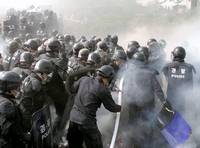
Several thousand South Korean riot police using blasts of water and the sheer weight of their numbers stormed a school compound near Camp Humphreys on Thursday and ousted protesters who’d been barricaded there for months.
Villagers and farmers don't feel like being evicted to make way for the camp's expansion.
The camp is to be tripled in size by 2008 to accommodate both the command headquarters in Yongsan, Seoul and infantry units stationed north of Seoul.
A consultation carried out before the eviction did not result in the farmers' concerns being taken into account, and appeared to be mainly for show, according to those protesting the eviction. Protesters have complained that the Ministry of National Defence, which initiated the request for an eviction order, acted unilaterally in deciding on an eviction deadline and was not prepared to listen to the needs of the residents.
In December 2004 the Korean government planned to give an extra 2,851 acres to the US Army base Camp Humphreys in Kyonggi province. In December 2005 the government's Land Expropriation Committee approved the 'imminent domain' seizure of the village of Daechuri, a move which made the farmers' existence on their land illegal.
After the "consultation" led by the Ministry of National Defence, the residents of Daechuri were offered a lump sum in compensation, determined on a low estimation of the value of their land. The area is reclaimed from tidal flats, meaning the land price was already low compared to other farming areas. It would be almost impossible to buy equivalent areas of land for subsistence farming with the lump sum offered.
The following, interestingly enough, comes from Military.com.
South Koreans Protest Planned U.S. Base
Pyongtaek South Korea -- Anti-US activists and villagers scuffled with police for a second day on Friday, May 5 at a site designated for expanded US military facilities south of Seoul. Several people were injured, according to police.
On Thursday, police armed with batons and shields evicted the remaining occupants and activists from an elementary school, a makeshift headquarters for the protesters. More than 500 were arrested, and some 210 police and protesters were injured.
"We will never fail to cultivate paddies. No farming means death for us," said a resident at Daechuri, who refuses to leave the village despite a government offer of monetary compensation.
To halt farming and ensure eviction, military engineer troops erected a 29-kilometre-long wire fence near Camp Humphreys in Pyongtaek, 70 kilometres south of Seoul, with the help of 15 UH-60 transport helicopters.
The Pyongtaek City government also designated 2.85m pyong (one pyong equals 3.3 square meters) as a restricted area for military facility protection at the request of the Defence Ministry.
"We will take steps to counter the government action, such as how to circumvent checkpoints surrounding the villages," said a civic activist from an ad hoc committee opposing plans to expand Camp Humphreys.
The land has been earmarked to enable Camp Humphreys to triple in size by 2008 and become the US military's chief installation in South Korea.
The US military plans to relocate its Yongsan Garrison in downtown Seoul and the 2nd Infantry Division near the border with North Korea to Pyongtaek.
But some farmers and organized protesters have defied government orders to leave the site and vowed to plant a new spring rice crop in spite of government efforts to evict them.
The Humphreys expansion is part of the US global troop realignment plan to transform its fixed military bases into more mobile, streamlined forces.
About 30,000 US troops are stationed in South Korea, a legacy of the 1950-53 Korean War. The two Koreas are still technically in a state of war since the Korean War ended with an armistice, not a peace treaty.
No comments:
Post a Comment